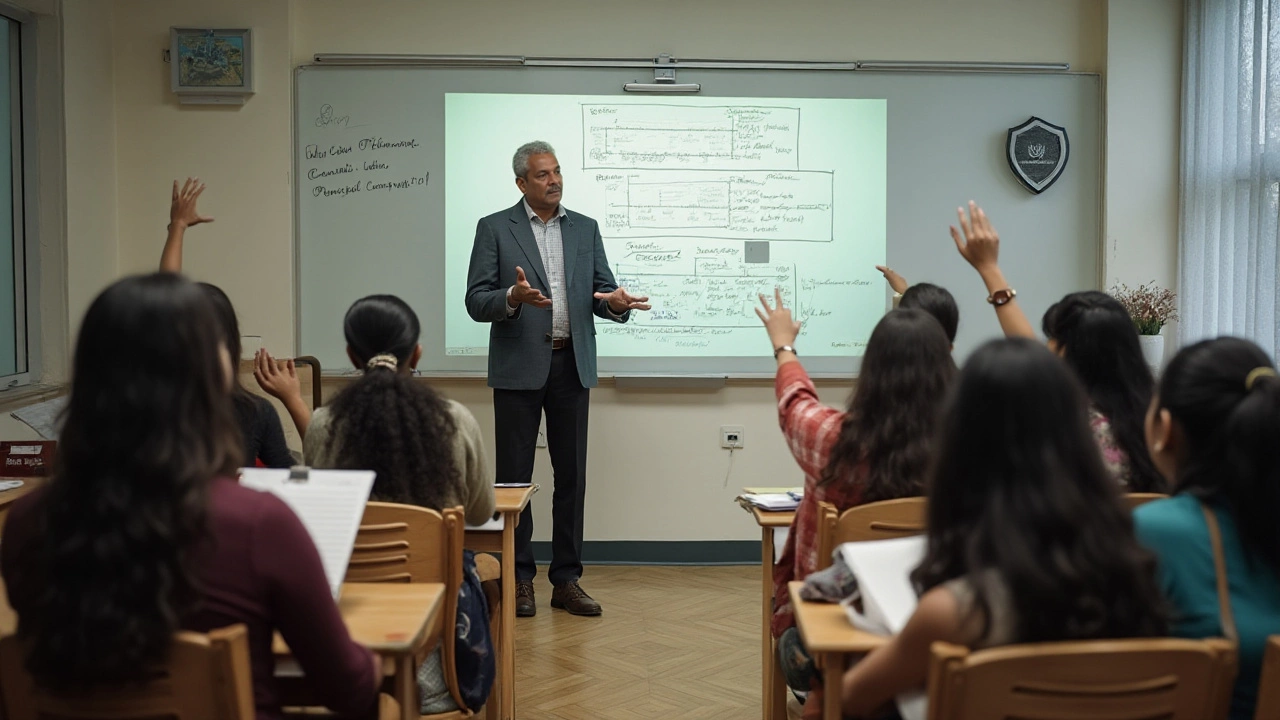Embarking on the path to become a lawyer in the USA is both a challenging and exhilarating endeavor. For those drawn to the nuances of the law and the prospect of advocating for others, this journey offers immense personal and professional satisfaction. However, it's not a venture to be taken lightly; one must be prepared for the rigors of study, examination, and practice.
As you consider this career, it's important to understand the necessary steps, from the educational foundations to the bar exam hurdles, and the real-world experience required to thrive in the legal field. Family law, in particular, adds layers of complexity and human emotion that require a unique skill set. Whether you're inspired by a sense of justice or the intellectual challenges of legal practice, exploring the intricacies of becoming a lawyer will equip you with vital knowledge on your journey ahead.
- Educational Requirements
- The Law School Experience
- Preparing for the Bar Exam
- Navigating Family Law Specialization
- Gaining Practical Experience
- Balancing Career and Family Life
Educational Requirements
To embark on the journey of becoming a lawyer in the USA, aspiring candidates must first lay a solid educational foundation. The path begins with obtaining a bachelor's degree, which is a prerequisite for law school. Unlike some professions, there is no specific major required for law school admission, which means students from diverse academic backgrounds can pursue this pathway. Nonetheless, courses in political science, history, criminal justice, and philosophy are often recommended as they hone critical thinking and analytical skills essential in the legal field. Many students also find that classes in writing and public speaking are beneficial, as these skills are vital for a successful legal career.
Navigating the undergraduate phase with intention can greatly ease the transition to law school. It’s crucial for students to maintain a high GPA, as law schools weigh academic performance heavily during the selection process. In addition, aspiring lawyers must pass the Law School Admission Test (LSAT), a standardized test that evaluates skills required for success in law school. The LSAT includes both multiple-choice questions and a writing sample, and it focuses on reading comprehension, analytical reasoning, and logical thinking. It’s worth noting that the LSAT is not something typically mastered overnight; students often invest months in preparation to achieve a competitive score. Resources such as prep courses, study groups, and practice exams are commonly used to enhance their performance.
The Journey Through Law School
Once admitted to law school, the road ahead becomes more specialized and refined. Law school traditionally spans three years, culminating in a Juris Doctor (JD) degree. The first year of law school is often the most strenuous, as it introduces students to the core subjects of law such as contracts, torts, property law, and constitutional law. This rigorous curriculum not only tests students’ intellectual limits but also immerses them in the language and culture of law. Students are expected to engage with complex legal texts and learn how to apply legal principles to hypothetical situations.
Many law schools offer elective courses in specific areas of law in the second and third years. For those interested in becoming a family law attorney, courses focusing on family law, mediation, and child advocacy would be particularly beneficial. Participating in a law review or moot court can also provide invaluable experience. Law review involves working on a scholarly legal journal, while moot court simulates appellate court proceedings. Both activities help hone research, writing, and argumentation skills, which are vital in the legal profession.
“Law schools develop your legal reasoning and analytical skills, which are essential for all aspects of practicing law,” says Jane Adams, a renowned legal scholar.
The educational pathway to becoming a lawyer in the USA is demanding but also deeply rewarding. Academic excellence and dedication are imperative, as is a genuine passion for the law and a commitment to continuous learning.
The Law School Experience
Walking through the doors of a law school marks a significant milestone for anyone aspiring to be a lawyer in the USA. It's a place where theories are questioned, arguments sharpened, and a broad understanding of the legal system is cultivated. Often lasting three years, this experience is intensive and transformative. From the first day, students are plunged into an environment that demands analytical rigor, precise language, and an unwavering commitment to learning. Engaging with subjects like contracts, torts, and constitutional law sets the foundational knowledge necessary for any successful legal career. The process of becoming conversant in these areas is no small feat and often requires late nights of reading casebooks, endless note-taking, and active participation in lectures.
One unique characteristic of the law school journey is the Socratic method employed by professors. This teaching style, rather than offering straightforward lectures, stimulates critical thinking and enhances the debate between peers and instructors. Perhaps daunting at first, this method encourages students to articulate their arguments confidently and learn to think on their feet—skills vital for any legal career. It's in these moments, under the gentle but insistent probing of a professor, that students begin to see the law not just as a system of rules, but as a living, breathing entity that affects all facets of society. Moreover, practical courses often simulate courtroom settings, providing a realistic taste of life in a courtroom. This practical approach is complemented by clinical courses which offer hands-on experiences in actual legal issues, under the supervision of practicing attorneys.
Networking is a critical component, too. Beyond just academic knowledge, law school is an ideal opportunity to develop connections with future colleagues and mentors. These relationships can later evolve into essential professional networks, providing support and opening doors to various opportunities within the legal landscape. Many institutions also host events, bringing in prominent figures from the legal profession to broaden students' perspectives and offer insights into diverse legal careers. As noted by the former Supreme Court Justice Sandra Day O’Connor, "The importance of cultivating professional relationships cannot be overstated; they often determine career trajectories and legal success."
Internships and clerkships during this period are essential in bridging the gap between classroom theories and real-world applications. Students are encouraged to take part in summer internships, which may range from working in law firms to nonprofit organizations, each providing a glimpse into the day-to-day responsibilities of a lawyer. Such experiences not only enrich one's understanding but also refine interpersonal and professional skills crucial in navigating the legal environment. By the time students reach their final year, they are typically balancing a complex dance of classes, internships, and bar exam preparation. It is this blend of academia and practice that produces well-rounded legal professionals capable of critical thought and effective advocacy.
The commitment doesn’t end with the degree; preparation for the bar examination is, in fact, an extension of the law school saga. However, that represents the culmination of this rigorous journey rather than a conclusion. The law school experience, in essence, is an amalgamation of intensive study, strategic thinking, and real-world application integrated to produce not only proficient legal practitioners but also adaptable and thoughtful contributors to society’s legal fabric. The passage through these demanding corridors is profound and prepares students for a future where they can be both advocates and architects of justice.

Preparing for the Bar Exam
Preparing for the Bar Exam is arguably one of the most challenging phases in the journey to becoming a lawyer in the USA. The exam, known for its rigor and comprehensiveness, assesses whether a candidate is competent to practice law in a specific jurisdiction. It's a two-day examination in most states, usually consisting of a Multistate Bar Examination (MBE), performance tests, and essays covering various legal subjects. This process requires an in-depth understanding of a broad range of legal topics, and aspirants should plan extensive study periods to cover this material adequately.
The preparation process often begins months in advance, as candidates delve into subjects like Constitutional Law, Criminal Law, and Torts. Most aspiring attorneys enroll in a bar review course, which offers structured study schedules, practice exams, and expert guidance. These courses, while a financial commitment, provide valuable frameworks that help manage the overwhelming amount of information. As one heads into this phase, it is crucial to balance study time with relaxation to avoid burnout. Prioritizing health amid long study hours can significantly improve retention and performance on exam day.
Time management is critical when studying for the bar. Crafting a detailed study schedule that allots specific times for reviewing different areas of law can be beneficial. Many successful candidates emphasize the importance of simulated practice under exam conditions. This includes taking timed practice exams to get accustomed to the pressure and pacing of the actual test. It can also reveal weaknesses that need additional focus. Surprisingly, some jurisdictions publish statistics showing that approximately one in four first-time takers do not pass. These figures underscore the difficulty and importance of thorough preparation.
Apart from intellectual readiness, mental fortitude plays a key role during this challenging time. Confidence can build from consistent study habits and self-care. Many find solace in quotes or advice from those who have paved the way. An insightful thought to consider might be from Justice Ruth Bader Ginsburg:
"Real change, enduring change, happens one step at a time."This speaks volumes in the context of bar preparation, reminding candidates that each study session contributes to a greater goal.
Aspirants should also understand the details specific to their state's bar exam. Requirements can vary, with some states also incorporating the Multistate Professional Responsibility Examination (MPRE) or additional state-specific components. Information about these requirements can usually be found on the respective state bar association's website. Staying informed allows candidates to adjust their study plans accordingly, ensuring that each aspect of the bar exam is given the attention it deserves.
In the months leading up to the exam, many test-takers form study groups, creating an environment for knowledge exchange and moral support. Such groups can foster a sense of community, making the preparation less solitary and more interactive. By putting heads together, candidates can clarify doubts, discuss complex legal issues, and share strategies for tackling difficult questions. As the countdown to the exam progresses, incorporating mock exams, engaging in discussions, and maintaining a healthy lifestyle can collectively fortify one's readiness for this pivotal legal milestone.
Navigating Family Law Specialization
Specializing in family law offers a dynamic and rewarding career path, albeit one that is often emotionally charged and complex. Family law practitioners deal with cases involving divorce, child custody, adoption, and other personal legal matters. To effectively navigate this specialization, one must develop a robust understanding of the intricate balance between legal stipulations and the sensitive nature of family dynamics. Understanding the unique aspects of this field requires one to not only learn the legal frameworks but also to cultivate empathy and communication skills. In family law, every case presents different challenges, which can make it uniquely engaging and demanding.
Family law attorneys must also stay updated on changing laws and societal shifts that affect families. This can include evolving definitions of family, rights for LGBTQ+ individuals, and international marriage and custody laws. For aspiring lawyers, developing a specialization in this area often involves undertaking additional coursework focused on topics like child welfare, dispute resolution, and financial settlements during law school. Beyond academic preparation, gaining practical experience through internships at family law firms or volunteering with organizations that support families can provide invaluable insights and skills. A strong foundation in these areas will prepare family law attorneys to offer both legal solutions and compassionate guidance.
Building a Client-Centric Practice
A family law attorney often finds themselves navigating deeply personal matters for their clients. Building a practice that is sensitive to the needs of individuals while advocating strongly for their rights requires a nuanced approach. Communication and negotiation skills are fundamental, as discussions can involve sensitive topics like asset division and child visitation. Competent lawyers must be adept not only in the law but in managing situations that are often emotionally volatile. Investing time into cultivating these skills can lead to higher client satisfaction and successful outcomes in cases involving complex family matters.
It is also beneficial to view each case as unique, understanding that what works in one case might not be applicable in another. This ability to adapt and tailor strategies to the specific needs and circumstances of the client sets successful family lawyers apart from the rest. Many lawyers in this field validate the importance of empathy and patience in being able to assist clients during difficult times. As legal expert Benjamin Cardozo once said,
“The law never is, but is always about to be.”This encapsulates the constantly evolving nature of family law, underscoring the need for flexibility and continued education in a lawyer's practice.
Legal Innovations and Technology
The impact of technology on family law cannot be overlooked. Innovations in legal tech, such as virtual consultations and electronic document management, are transforming how family law attorneys operate. These advancements allow for greater accessibility and efficiency in handling cases, providing lawyers with more tools to manage their workload effectively. For instance, case management software can streamline the process of tracking case progress and client interactions, while online dispute resolution platforms can offer alternative measures to conflict resolution, reducing the need for courtroom battles.
Adopting technology requires lawyers to be proactive in finding and integrating the best tools available to enhance their practice. This can reflect positively on client relations, as technology can provide more flexibility and convenience in communication. Moreover, legal technology can bridge geographical gaps, enabling attorneys to work with clients across different locations without the constraints of traditional face-to-face meetings. As the field continues to grow, embracing these innovations and adapting to new ways of working will be essential for any family law attorney seeking to build a successful practice in today’s increasingly digital landscape.

Gaining Practical Experience
One crucial step aspiring lawyers cannot afford to overlook is the accumulation of practical experience. Academic knowledge lays the foundation, but true competence in the legal domain requires hands-on involvement in real-world cases. For anyone envisioning a career as a lawyer in the USA, particularly in intricate fields like family law, practical exposure forms an essential part of their learning process. This not only equips them with crucial skills but also instills a profound understanding of how the legal system functions outside the pages of textbooks.
Engaging in internships and clerkships during law school offers invaluable opportunities for budding legal practitioners. These roles, often available in law firms, courts, or government agencies, immerse students in substantial tasks like legal research, drafting documents, and even observing courtroom proceedings. Through these, students start to see the dynamic nature of legal debates and the critical thinking involved in resolving them. Successfully completed internships can also provide a competitive edge during job searches, as employers appreciate real-life practice over mere academic achievements. Networking with seasoned attorneys during these experiences can open doors to mentorships and future collaborations. It's about forming meaningful professional relationships as much as it is about skill-building.
Participation in legal clinics during one's time in law school can significantly enhance practical knowledge. These clinics act as a bridge between academia and professional life, enabling students to work with actual clients under the supervision of experienced attorneys. For those passionate about areas like family law, legal clinics offer a chance to grapple directly with complex, emotionally charged cases, such as custody disputes and divorce settlements. The hands-on approach not only bolsters a student’s confidence but also develops their empathy and patience, essential traits for any family law attorney. An enriching clinic experience can often define one’s legal perspective, shaping their career trajectory significantly.
"Practical experience not only enhances legal library knowledge but embodies the spirit and empathy essential in a law practitioner," notes Justice John Doe, a respected figure in the field of family law.
Another intrinsic aspect of gaining practical experience is pro bono work. Offering legal services for free to those who cannot afford it, pro bono work is not just a means of gaining experience but an obligation inscribed in the ethical doctrine of the legal profession. Young lawyers volunteering their time often receive guidance from seasoned professionals, thus refining their skills while contributing to their community. Pro bono services in family law cases, such as representing low-income clients in custody battles or adoption procedures, offer profound insights into societal dynamics and the lawyer's role as a contributor to social justice.
The role of continued education and certifications cannot be neglected either. For a legal career to thrive, lawyers must stay abreast of new laws and legal precedents. Joining professional associations provides resources and courses essential for knowledge updates, while certifications in specialized fields reinforce expertise. For example, becoming a certified family law specialist can solidify one’s credibility and attract potential clients. These continuous learning paths ensure effectiveness and adaptability in a rapidly evolving legal landscape.
Finally, embracing technology in law practice is becoming indispensable. With the advancement in tools like legal software for case management and virtual courtrooms, aspiring lawyers must adapt to new procedural frameworks. Workshops and training in technological aspects prepare law graduates for modern practice nuances, equipping them to handle tech-driven case environments efficiently. This adaptability not only enhances a lawyer’s problem-solving capacity but also assures clients of a progressive approach to their concerns.
Balancing Career and Family Life
For many lawyers, particularly those specializing as a family law attorney, balancing a demanding legal career with family commitments can sometimes feel like a high-wire act. The legal profession is known for its intensive workload which can stretch into long hours, sometimes making family responsibilities seem secondary. However, achieving a work-life balance is not only possible but essential for a sustainable career and personal fulfillment. This balancing act often requires strategic time management, clear prioritization, and sometimes, a little bit of creativity. Finding time for family amidst a schedule packed with client meetings, court appearances, and case research means being fully present in each role you play, whether it’s as a dedicated legal professional or a loving parent, like myself with Aryan and Leela.
A successful strategy in managing career and family concurrently involves setting boundaries that prioritize both professional responsibilities and personal time. Lawyers often find it helpful to delineate specific 'work hours' and 'family hours,' ensuring that once they are home, the focus is squarely on family. This might mean turning off work emails or putting the phone away during dinner times. Implementing such boundaries not only enriches personal relationships but also rejuvenates mental strength needed for tackling courtroom challenges. It’s important to share these boundaries with colleagues and clients to set realistic expectations about availability and ensure uninterrupted family dedication.
Support systems, both at work and home, can greatly ease the juggling of roles. At the workplace, collaborating with understanding colleagues or having a capable team to rely on can provide invaluable support during demanding times. At home, sharing responsibilities with a partner or enlisting help from family can create a more balanced approach to managing family life alongside a typically hectic lawyer's schedule. Firms, recognizing the need for balance, often introduce flexible working hours or remote work options to accommodate their staff's personal commitments. According to the American Bar Association, firms offering these options witness improved productivity and retention rates, emphasizing that a balanced life significantly contributes to professional success.
One of the often overlooked aspects of balancing is self-care. For lawyers, especially those in the emotionally intense sphere of family law, preserving mental and emotional health is key. A regular practice of exercise, meditation, or hobbies can be a crucial element, acting as an outlet for stress relief and maintaining overall well-being. Making time for oneself might seem challenging, but it enhances resilience, thus making it easier to handle both personal and professional demands more effectively. Engaging in community or leisure activities can also offer a needed break, ensuring that the weight of client disputes doesn’t overshadow personal life.
Achieving balance is also about having difficult conversations about workload and responsibilities. Many legal professionals find themselves in environments that require constant output, so it’s vital to speak up about your needs. Whether it's negotiating for more flexible working arrangements or proactively managing workload, these discussions are vital for sustainable balance. Academic studies have shown that lawyers who advocate for their personal needs and prioritize work-life balance report greater job satisfaction and lower stress levels. As one lawyer noted, "My ability to be present and engaged at work and at home has only improved since I began setting firm boundaries and evaluating my commitments regularly."
Citing inspiration from Michelle Obama, who eloquently said, "We need to do a better job of putting ourselves higher on our own 'to do' list," lawyers are encouraged to prioritize their well-being to perform better both personally and professionally.
The pursuit of a fulfilling career while being an invested family member is a journey marked by personal adjustments, professional negotiations, and sometimes reinventing traditional roles. Embracing technology can serve as a practical ally, offering innovative solutions to streamline tasks and create more time for family activities. Mobile workspaces and legal software can allow attorneys to manage cases more flexibly, highlighting that professional commitments don’t necessarily have to infringe on precious family moments. A balanced life for a lawyer is not just beneficial for personal happiness but also for nurturing a rewarding, sustainable career.


